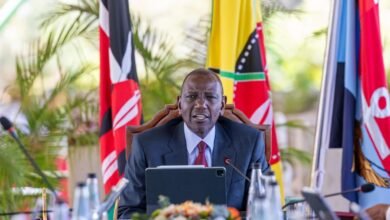
The 31st International Convention organized by the Institution of Engineers of Kenya (IEK) commenced at Mombasa’s Pride Inn Paradise Beach Resort today, marking a pivotal gathering aimed at propelling Kenya’s industrial and economic growth. Over 3,000 engineers, policymakers, industry leaders, and stakeholders have come together to address the country’s pressing engineering challenges and outline the trajectory toward a sustainable and industrialized economy under the theme “Industrialization for Economic Transformation and Employment Creation.”
Sustainable Engineering as a Pillar for Kenya’s Growth
In his opening remarks, IEK President Eng. Shammah Kiteme underscored the critical role of engineering in achieving Kenya’s economic ambitions. He emphasized that sustainable engineering solutions are not just preferable but essential to ensure long-term growth and resilience in Kenya’s infrastructure and economy.
“Engineering is central to Kenya’s economic ambitions, and this convention highlights how our profession contributes to sustainable job creation and industrial progress,” said Eng. Kiteme. “To secure long-term growth, we must embrace engineering solutions that respect and preserve our resources. Sustainable engineering principles aren’t just ideal—they’re essential for creating resilient systems that will support Kenya for generations to come.”
Eng. Kiteme further highlighted the importance of maximizing resource utilization while minimizing waste, stating that Kenya’s sustainability hinges on engineering practices that prioritize environmental stewardship alongside economic progress.
Government’s Commitment to Infrastructure and Industry
Hon. Davis Chirchir, the Cabinet Secretary for Roads and Transport, served as the Chief Guest and reiterated the government’s commitment to advancing Kenya’s infrastructure and industrial goals. He linked the convention’s objectives to Kenya’s Bottom-Up Economic Transformation Agenda (BETA) and Vision 2030, both of which prioritize industrialization and job creation as pillars for economic recovery and global competitiveness.
“It is clear that industrialization is not merely an option—it is a necessity,” said Hon. Chirchir. “Our Bottom-Up Economic Transformation Agenda and Vision 2030 emphasize the importance of harnessing our human capital and industrial potential to drive economic recovery, ultimately making Kenya a globally competitive nation by 2030. We envision a future where we are a newly industrializing, middle-income country providing a high quality of life for all our citizens within a clean and secure environment.”
Hon. Chirchir also highlighted the importance of empowering local professionals, stating the government’s commitment to engaging with IEK, the Association of Consulting Engineers of Kenya, and the Engineers Board of Kenya. “By prioritizing local talent and expertise, we will not only build capacity within the engineering community but also stimulate job creation and economic activity in our regions,” he added.
Mombasa’s Role in Supporting Industrialization
Mombasa County Governor, Hon. Abdulswamad Shariff, expressed his pride in hosting the convention and emphasized the strategic importance of Mombasa in Kenya’s industrialization goals. “Mombasa is honoured to host the distinguished engineers, policymakers, and industry leaders gathered here today. This convention not only supports Mombasa’s infrastructure and employment goals but also aligns with our broader vision of economic transformation for Kenya,” he said.
Governor Shariff emphasized that the outcomes of the convention have the potential to yield significant benefits, particularly in terms of creating tangible opportunities for the youth in Mombasa. He noted that the discussions and innovations emerging from this four-day event could play a significant role in enhancing Kenya’s position as a leader in East Africa’s industrial sector.
A Packed Schedule of Engineering Innovations
The convention features a full lineup of workshops, technical sessions, and panel discussions covering a wide array of topics, including sustainable infrastructure, renewable energy, and the latest advancements in engineering technologies. This comprehensive schedule is designed to foster knowledge-sharing and collaboration across various engineering disciplines, paving the way for solutions that address Kenya’s unique industrial challenges.






